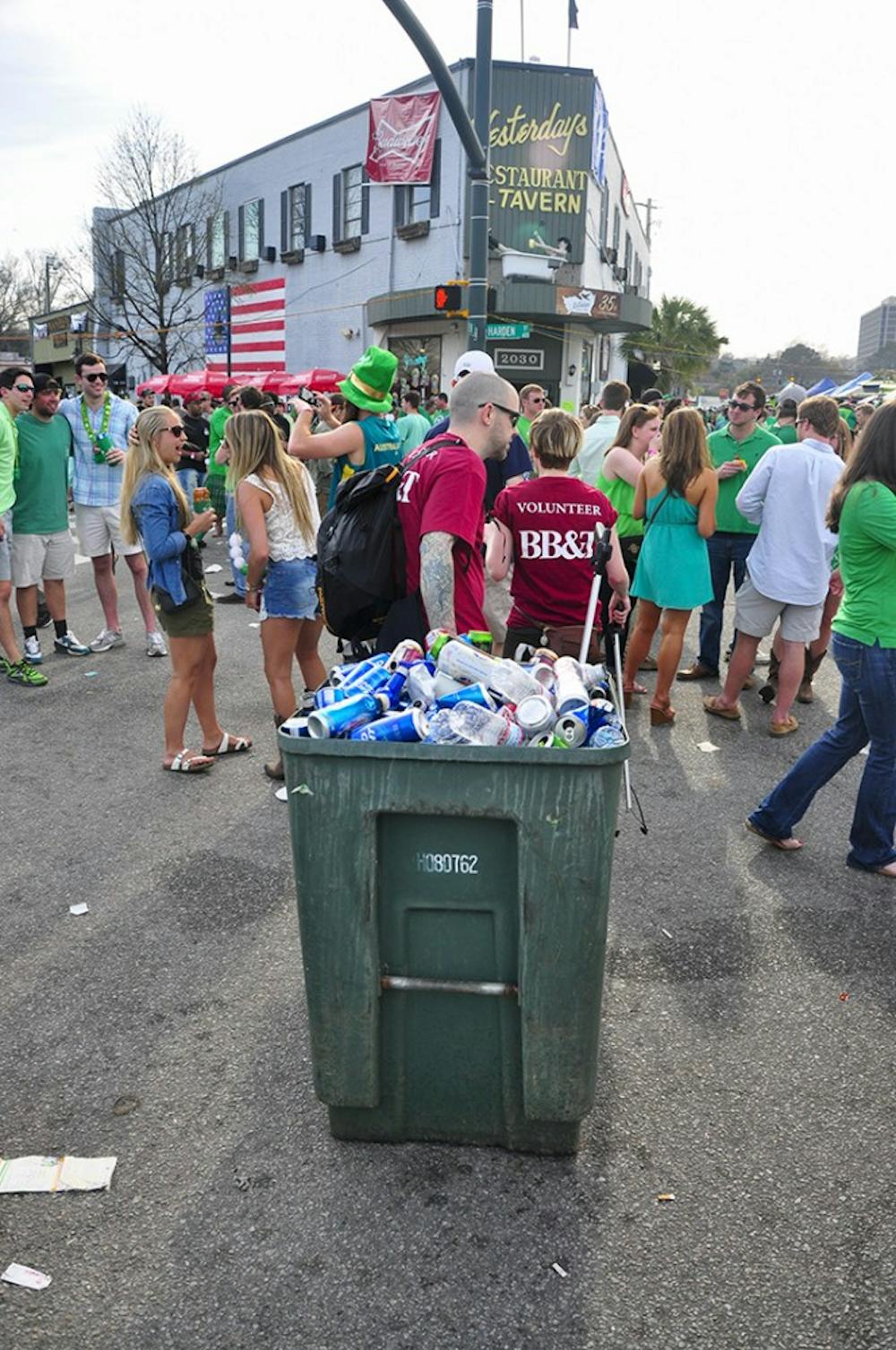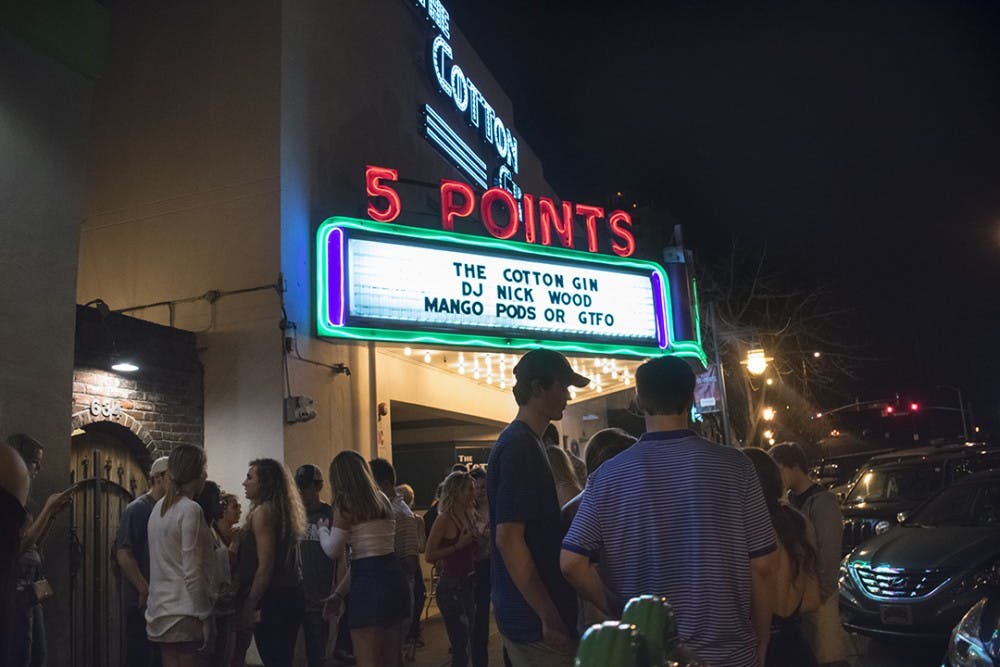Three friends stagger slowly across Devine Street, waiting until the light turns green to cross. One of them continuously looks at the ground.
"Someone took my phone," he says, head low as if the missing device might suddenly appear at his feet.
Along the streets in Five Points at almost 3 a.m., valuables can disappear into the dark corners and dispersing crowds. But lost phones aren't the only concern in the community — there's an increasing concern about the wandering, inebriated students. Late-night drinkers can either fall into an Uber and then go to bed or disperse into the neighborhoods around Five Points and wreak intoxicated havoc. That possibility has led to a renewed effort in the city council to close all bars in the city at 2 a.m. every night.
What's the problem?
USC students drink in bars at a much higher rate than the national average — 37 percent compared to 11 percent.
“They’re loud, they disturb the people that are trying to get a good night’s sleep, they turn over trash cans, they beat up the street signs, they knock over the flower pots on the porches, they steal porch furniture off the porches, they are so inebriated they get sick all over the sidewalks," said Columbia city councilman Howard Duvall. "It is a bad situation that’s got to be tackled.”

According to the university, about 254 students were transported to local hospitals for alcohol-related illness during the 2016-17 school year. That number has more than doubled since 2011.
Fourth-year biology student Andrew Griffin says it is lively in Five Points even past 2 a.m. Even if safety is a concern, there is a constant security presence.
"There's so many cops here, it doesn't matter," Griffin said.
"People are going to do what they want to do regardless," said his friend, third-year psychology student Mia Gladden.
What's the current debate?
Before 2011, bars had no mandatory closing time except on Sundays. The 2011 state law put the current 2 a.m. closing time in place, but many cities created special permits to allow the sale of non-distilled alcoholic beverages, such as beer and wine, after 2 a.m.
In Five Points, 17 bars currently have one of those permits, which costs just $50 for a year and comes with stipulations such as not conducting drinking contests and additional training for bartenders.
But SLED routinely busts bars for serving hard liquor after 2 a.m., including citing 11 Five Points bars in early February.
"It just started again because everybody got called out for not having a license after 2," said fourth-year computer engineering student Darius Brown, referring to those 11 bars and SLED's presence.
Duvall says the situation has gotten worse over the last year and a half "because of the great increase of the students coming into USC and not being able to find housing on campus and so they are saturating the neighborhoods that surround Five Points."
USC Vice President of Student Life Anna Edwards disagreed with Duvall's assertion about off-campus housing but agreed that drinking in Five Points is a big issue in the eyes of the university.
"The goal is to create that safe and healthy entertainment environment," Edwards said. She said that the university has introduced new education efforts such as Alcohol EDU, but policy and enforcement have to come from the community.
"I strongly encourage you and your Members to oppose any measures granting special permission to bars requesting to remain open past 2 a.m.," University President Harris Pastides wrote in a letter to the city council.
At a town hall Feb. 6, those in attendance — bar owners, community members, council members — seemed evenly split on the issue. Bars that haven't gotten any violations were opposed to being punished for others' mistakes. Ten neighborhoods have signed on to support the removal of special permits.
What would the outcome be?
Students wouldn't necessarily stop drinking if the bars shut at 2 a.m. — instead, some said, they'll find somewhere else.
“It doesn’t make much of a difference because if they’re not drinking here, they’re going to go drink somewhere else,” said Sean McManus, a regular at Bar None.
The measure would help reduce the high number of student transports to the hospital for alcohol-related issues, according to Edwards.
With every other town in South Carolina already ceasing the dispersal of after-hours permits, Duvall said that it made sense for Columbia to follow.
McManus, though, said that all the bars in his hometown of Madison, Wisconsin, close at 2 a.m. and the city still seems to have the same problems that Columbia is looking to fix.
University of Wisconsin-Madison has about 25 percent more students than USC but 250 percent more violations of substance abuse policies, he said.
He also disagreed that the earlier close time would bring peace to the homes around Five Points.
"If somebody were wandering around my neighborhood at 2, 2:30 in the morning drunk, being loud, I’d be just as pissed off as if they were doing it at 4:30," McManus said.
Nationally, the most common place for students to drink is in on- and off-campus residences. If the percentage of USC students drinking in bars dropped, the university could see an increase in residential drinking.
According to Andrew Douglas, a music performance student and bouncer at Bar None, the earlier closing time could actually cause more problems for police because it would create a huge rush of students at 2 a.m. instead of a slow trickle from 2 a.m.
“It would be way worse ... Saturday, everybody knows you gotta get out by 2, so what are people doing?" Douglas said. "Knocking them back as fast as they can so they can get as drunk as they can and get out of here too. And then you have everyone out here at 2 o’clock on a Saturday stumbling around, trying to find their Ubers. The police are running around trying to just hold it down. It’s a logistical nightmare."
Even if the current permits are revoked, it wouldn't necessarily mean the end of late-night drinking in Columbia.
“If the Whig, the Bar None and Nightcaps think of alternative situations that would allow them to continue," Duvall said, "I certainly would be willing to talk to them about some compromise on the situation."
According to Edwards, any change has to involve a consideration of student safety.
"We've got to re-evaluate how we see bars in our community," she said.
*This article has been altered to correct the higher number of substance abuse violations at UW-Madison compared to USC from 350 percent to 250 percent.

